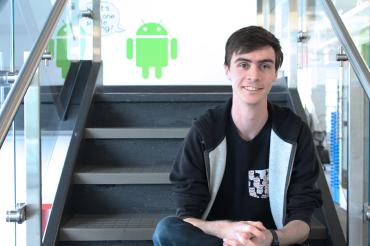How one U of T alumnus went from slinging drinks in undergrad to Geoffrey Hinton's AI lab

Published: October 10, 2018
Nick Frosst, a researcher at Google Brain in downtown Toronto, didn’t require a master’s degree or PhD to launch a career in artificial intelligence research – all he needed was a chance meeting at a bar in Koreatown.
“I was working at Snakes and Lattes and started talking to a customer about the computability of a game he was playing,” says Frosst, a University of Toronto Woodsworth College alumnus who, at the time, was in the second-year of his undergraduate studies in the department of computer science.
That fateful conversation led to an introduction to York University’s John Tsotsos, a former U of T associate chair of computer science, and a position as an undergraduate research assistant. Not long after, Frosst was striking up similar conversations with his U of T professors and undertaking several independent research studies – a path that led him to his current gig at Google Brain.
On Nov. 3, Frosst will be a panelist at the Start AI conference at the MaRS Discovery District. Organized by U of T’s Undergraduate Artificial Intelligence Group, it’s the organization’s first-ever conference to focus on opportunities in the AI field for bachelor’s graduates.
Over 300 people from across the province are expected to attend.
While Frosst says those early independent research studies at U of T “didn’t get huge results,” he nevertheless described the overall experience as invaluable.
“I learned a lot about what it means to set up an experiment and how to talk to people about what you’re working on,” he says.
“There are many professors doing interesting research – stuff that's really groundbreaking and pushing the boundaries – so they want and need help. U of T, especially, has the potential for undergraduate research to be really commonplace.”
As for Google Brain Toronto, Frosst is now part of a 10-person research team led by U of T University Professor Emeritus Geoffrey Hinton. Hinton, a vice-president and fellow at Google, is widely known as the “godfather of deep learning,” a branch of artificial intelligence that trains computers to reason like humans. He will be Start AI’s keynote speaker.
“I got connected to the Google Brain team because I was working [for Google] in Waterloo and spending a day or two here in Toronto,” says Frosst. “I certainly wanted to work with [Hinton], so I introduced myself and made that known. He’s a really funny guy, so it’s pretty easy to strike up a conversation with him.”
At Google Brain, Frosst and his colleagues do fundamental research that seeks to improve AI’s neural networks. This doesn’t mean simply making AI better at solving problems, or improve its usability in the next app, he says, but improving the neural networks themselves – which, in turn, creates a host of new problems that need solving.
In a paper published last year, Hinton, Frosst, as well as lead author and fellow Google researcher, Sara Sabour, who has a master’s in computer science at U of T, showed off what they believe is the next evolution: capsule networks. It immediately caused a stir. Frosst says Sabour’s project intends to define an entirely new structure for neural nets.
Read more about the paper by Sabour, Frosst and Hinton at U of T News
“Let's say you've trained a network to detect cats or dogs in an image,” explains Frosst. “A regular convolutional network might have a unit that detects the eye of a cat, or the ear of a cat, or the tail of a cat.
“Up at the top of the network, your top-level cat unit sums up all the features to say whether or not it's a cat. But it’s not making use of the relationship between those entities.”
Frosst says a capsule network, by contrast, looks for agreement between features – in this instance, a cat’s features – as opposed to just the presence of them, which he says turns out to be pretty useful for a number of problems, including object recognition. However, capsule networks will need to perform faster, and be easier to use, to reach their true potential.
At Start AI, Frosst will take part in a panel discussion on AI hype versus reality.
“There's a crazy amount of [AI] hype,” he says. “One of the problems is the shifting definition of AI. Headlines that say things like, ‘AI beats Go player,’ as opposed to ‘statistical analysis beats go player.’
“When someone says AI now, what they likely mean is machine learning – and probably what they really mean is neural networks. But 20 or 30 years ago, if you said AI, you meant symbolic reasoning and logic and natural language processing … All these things that are still useful and used today – but it’s not what people mean when they say AI, for the most part.”
Frosst is also part of an indie band called Good Kid, whose members are all U of T alumni working tech industry roles at Google, Shopify and Snapchat. The band just reached 1.5 million streams on Spotify.
Suffice it to say, Frosst isn’t planning to return to academia any time soon.
“I really enjoyed my undergrad at U of T,” he says. “It was a super fun time. I miss elements of it, giving tutorials, office hours and talking to people. And taking classes outside of computer science in history and philosophy.
“But I'm enjoying doing research in industry. The machine learning field is still wide open, expanding and shifting in ways that's always exciting.”



